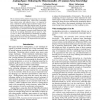Free Online Productivity Tools
i2Speak
i2Symbol
i2OCR
iTex2Img
iWeb2Print
iWeb2Shot
i2Type
iPdf2Split
iPdf2Merge
i2Bopomofo
i2Arabic
i2Style
i2Image
i2PDF
iLatex2Rtf
Sci2ools
AAAI
2008
2008
AnalogySpace: Reducing the Dimensionality of Common Sense Knowledge
We are interested in the problem of reasoning over very large common sense knowledge bases. When such a knowledge base contains noisy and subjective data, it is important to have a method for making rough conclusions based on similarities and tendencies, rather than absolute truth. We present AnalogySpace, which accomplishes this by forming the analogical closure of a semantic network through dimensionality reduction. It self-organizes concepts around dimensions that can be seen as making distinctions such as "good vs. bad" or "easy vs. hard", and generalizes its knowledge by judging where concepts lie along these dimensions. An evaluation demonstrates that users often agree with the predicted knowledge, and that its accuracy is an improvement over previous techniques.
Related Content
| Added | 02 Oct 2010 |
| Updated | 02 Oct 2010 |
| Type | Conference |
| Year | 2008 |
| Where | AAAI |
| Authors | Robert Speer, Catherine Havasi, Henry Lieberman |
Comments (0)

